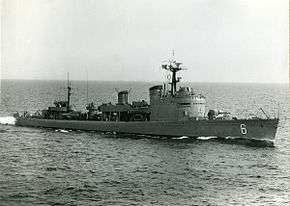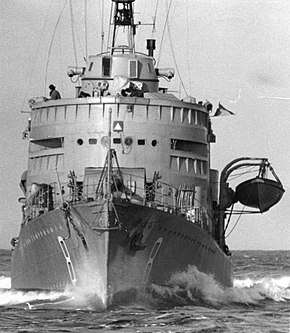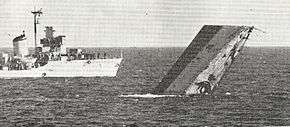Göteborg-class destroyer
The Göteborg class was a Swedish World War II destroyer class. Built from 1936–1941 the class was designed as escort and neutral guard destroyers. In total six ships were constructed, HSwMS Göteborg, HSwMS Stockholm, HSwMS Malmö, HSwMS Karlskrona, HSwMS Gävle and HSwMS Norrköping. After World War II the destroyers, later rebuilt as frigates, continued to serve in the Swedish navy. The last ship was decommissioned in 1968.
.jpg) HSwMS Göteborg | |
| Class overview | |
|---|---|
| Operators: |
|
| Preceded by: | Klas class |
| Succeeded by: | Visby class |
| Built: | 1933–1941 |
| In commission: | 1936–1968 |
| Planned: | 6 |
| Completed: | 6 |
| Retired: | 6 |
| General characteristics | |
| Type: | Destroyer/frigate |
| Displacement: | 1,060–1,240 tons |
| Length: | 92.7 m (304 ft) |
| Beam: | 9 m (30 ft) |
| Draught: | 3.8 m (12 ft) |
| Propulsion: | Twin screws, turbines |
| Speed: | 39 kn (72 km/h; 45 mph) |
| Range: | 3,333 km (1,800 nmi; 2,071 mi) |
| Complement: | 130 |
| Armament: |
|
History


In 1933 the Swedish government granted the construction of two new destroyers.[1] The destroyers were given names of Swedish coast towns and so this class was called Stadsjagare (City destroyers). The first ship was delivered in 1936 and the second in 1937. In 1936 two additional destroyers were ordered and after the war broke out a third pair was ordered as well.[2] After the war all destroyers except Göteborg which was in poor shape from the Hårsfjärden disaster received a refit where the center gun was moved to the X position on the aft deckhouse and the anti-aircraft armament (consisting of four modern Bofors 40 mm L/70 guns) was concentrated on a platform around the rear funnel. In 1958–1963 three of the destroyers were rebuilt as frigates that included a change of armament. The first ship to be decommissioned was Göteborg in 1958. In the decade that followed all ships were decommissioned, the last in 1968.
The famous Swedish marine engineer Curt Borgenstam called the Göteborg class the most beautiful and well working destroyer class to have served in the Swedish navy.[3]
Ships

| Name | Number | Builder | Laid Down | Launched | Commissioned | Fate |
|---|---|---|---|---|---|---|
| Göteborg | 5 | Götaverken | 1934 | 14 October 1935 | October 1936 | Stricken 15 August 1958[4] Sunk as target 14 August 1962[5] |
| Stockholm | 6 | Karlskrona dockyard | 1934 | 24 March 1936 | 27 November 1937 | Stricken 1 January 1964[4] Scrapped 1965[6] |
| Malmö | 7 | Eriksberg | 1937 | 22 September 1938 | 15 August 1939 | Stricken 1 January 1964[4] Scrapped 1970[6] |
| Karlskrona | 8 | Karlskrona dockyard | 1937 | 19 June 1939 | 12 September 1940 | Stricken 1 July 1974[4] Scrapped 1979[6] |
| Norrköping | 10 | Eriksberg | 1939 | 25 September 1940 | 9 April 1941 | Stricken 1 February 1965[4] |
| Gävle | 9 | Götaverken | 1939 | 23 September 1940 | 30 June 1941 | Stricken 6 December 1968[4] Used as generator at Simpevarp nuclear power station[6] |
References
- Borgenstam, Insulander & Kaudern 1989, p. 48
- Borgenstam, Insulander & Kaudern 1989, p. 50
- Borgenstam, Insulander & Kaudern 1989, p. 52
- Whitley 2000, p. 249.
- Gardiner and Chesneau 1980, p. 372.
- Gardiner and Chumbley 1995, p. 443.
Sources
- Borgenstam, Curt; Insulander, Per; Kaudern, Gösta (1989), Jagare: med Svenska flottans jagare under 80 år (in Swedish), Västra Frölunda: Marinlitteratur, ISBN 91-970700-4-1, SELIBR 7792227
- Gardiner, Robert; Chumbley, Stephen (1995), Conway's All The World's Fighting Ships 1947–1995, Annapolis, Maryland, USA: Naval Institute Press, ISBN 1-55750-132-7
- Gardiner, Robert; Chesneau, Roger (1980), Conway's All The World's Fighting Ships 1922–1946, London: Conway Maritime Press, ISBN 0-85177-146-7
- Jackson, Robert (2004), Fighting Ships of The World, London: Amber Books Ltd, p. 306, ISBN 9781840136470
- Whitley, M. J. (2000), Destroyers of World War Two: An International Encyclopedia, London: Cassell, ISBN 1-85409-521-8